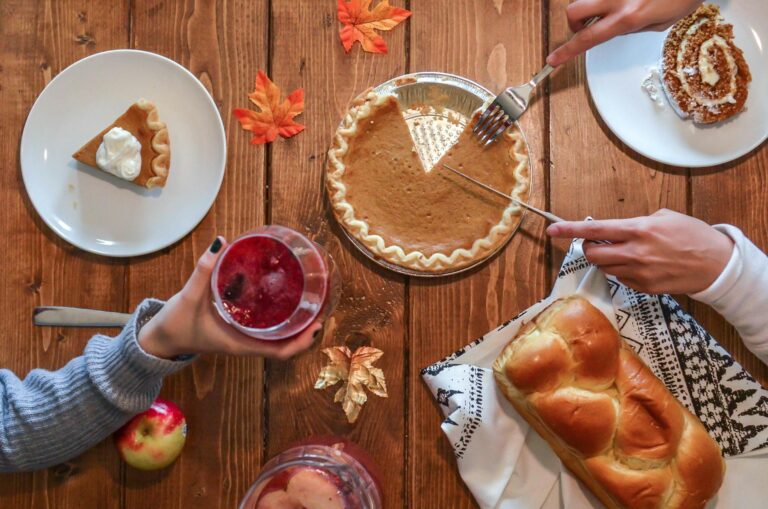Whether you are 50 or 16 body image for women is a tough thing. The ideals and pressures our culture puts on us are unrealistic and unhealthy! I’ve felt them and so have you. That’s why holiday weight gain and all those delicious family traditions might put you on edge or leave you feeling bad about yourself after enjoying a festivity.
Diet culture and unrealistic expectations for our bodies can easily make us miserable when we think about holiday weight gain and the dangerous fact about it is…… our kids are watching.
Holiday weight gain is something I am sure we all want to avoid but let’s look at some numbers. You might think you’re gaining all this weight but the average weight gain for Americans over the holidays is 0.8-2 pounds! That’s probably not what you were expecting, its no where near the 10-15 pounds we convince ourselves we are putting on!
We are going to discuss ways we can overcome the stress of holiday weight gain and model a healthy relationship with food for ourselves and our kids. I’ll give you ideas how to enjoy and manage holiday sweets. You’ll find tips to help refocus on what really matters. I’ll introduce mindful eating and give you a solid action plan for your holiday eating!
- The Surprising Truth About Holiday Weight Gain (What the Research Really Shows)
- What Your Kids Are Learning When You Stress About Holiday Weight Gain
- What Actually Matters More Than the Scale This Holiday Season
- How Holiday Weight Gain Connects to the 8 Pillars of Wellness
- Your Simple Holiday Eating Action Plan
- The Legacy You're Creating This Holiday Season
The Surprising Truth About Holiday Weight Gain (What the Research Really Shows)
The Real Statistics
I mentioned above that on average people only gain about 1-2 pounds over the holidays, that’s normal. In fact for most of us, that can just be normal weight fluctuation or happen because of the clothes we are wearing. The truth is that holiday weight gain poses downsides that have nothing to do with the numbers on our scale or size of our pants.
I’ll cover that a bit more later, but keep that in mind.
Even though the numbers shouldn’t be the focus the diet industry throws them in our face all the time, especially in forms of calories and how much weight someone lost. That’s what marketing is all about. They want you to buy their product or take their pill, so they use dramatic numbers and use marketing tactics that make you feel like your numbers are wrong. Don’t take the bait. Don’t forget that ads and social media don’t care about your well being and body image they care about sales.
It is normal for your weight to fluctuate 2-5 pounds due to diet, hydration and hormonal changes. In fact, eating all that sodium and those delicious carbs cause more water retention. The scale will go up after you eat, there is more in your body to weigh, but it doesn’t mean its fat!
For the scale to actually show fat it would be a couple days! Moral of the story don’t panic after one meal. Trust your body to do what is best for you when you do what is best for it!
Source: The Truth About Holiday Weight Gain
Why Restriction Backfires (Especially for Moms)
If you have ever tried dieting, you know what it is like to CRAVE that candy bar. I usually try eating a million “healthy” things to satisfy my craving. That means a whole ton more calories for me compared to if I would have just eaten the candy bar. It’s a cycle. Getting stressed about restricting yourself actually causes the stress hormone to be more abundant. That then causes increased weight gain because your body assumes it is under duress and you need to store energy!
When we restrict ourselves from foods, we don’t teach ourselves or our kids how to eat them in moderation and manage our feelings around them! We don’t want our kids feeling bad about themselves when they eat their favorite foods, so we need to model that behavior.
What Your Kids Are Learning When You Stress About Holiday Weight Gain
The Hidden Lessons We’re Teaching
There are a lot of studies that show if we are struggling with food or body image, chances are so are our kids. They see us, hear us and learn from everything we do.
The cost of worrying about holiday weight gain or weight gain in any other time of the year just isn’t worth the negative messages about bodies that we are sending our kids, both girls and boys. We want our kids to love food and love eating and most importantly love themselves!
Now let me be clear, I’m not saying it’s wrong to care about how you look or that we can just eat whatever all time. I am saying weight gain should not be our main focus and rather it should be trying to do what is best and treat our bodies in the best way possible.
What Healthy Food Relationship Modeling Looks Like
A healthy relationship with food can’t be modeled if we don’t know how to do the modeling. So before we work on helping our kids, we have to help ourselves.
The first and most important thing is words. Words we say out loud, words that we say to ourselves, and words we believe.
We need to speak positively to ourselves about our bodies, speak positively or not at all about other people’s body size and what they’re eating, and focus on believing words from the people we love rather than social media.
It helps to say things like “I’m so grateful my body can “blank” for me.” “I’m glad the food I eat helps me be strong so I can “blank”.” “I’m grateful for *body part* because it helps me do “blank” for my kids.”
We can show our kids that we enjoy treats as much as we enjoy our vegetables. We can celebrate the fact that we get to eat both. We can show them that all types of foods can fit in a balanced lifestyle.
Real-Life Example: What to Say Instead
Here’s some things you might say:
Ugh, I really shouldn’t be eating this.
I’m fat.
Eating a bunch of junk food makes you fat.
We have to eat vegetables so we can be skinny.
I hate the way my *part of body* looks.
Have you seen her lately she looks so skinny!
Wow that person’s fat.
I gotta exercise so I can eat this dessert.
Here are somethings we should say instead:
I love this food!
I am grateful for everything my body can do!
Eating a variety of foods like vegetables and our favorite ones help us feel good and be healthy!
Vegetables are important so that our bodies can get all the nutrients they need, so we can play and do all the things we love.
I’m glad I have arms so I can hug you.
She is such a nice person.
I’m going to enjoy a nice walk tomorrow to show my body I love it.
The Long-Term Gift You’re Giving
The truth is, your kids don’t care about what your body looks like. You don’t hear kids going around saying “my mom is so skinny which makes her the best”, Or “did you see how skinny my momma’s thighs look, that makes her so cool”.
But… what they will say one day is I wish I was skinnier and I wish my thighs looked skinny. These messages are what we’re giving our children when we don’t model a healthy relationship with food or our body.
Holiday weight gain can be easily avoided by some healthy habits and enjoying all the foods that we love. Shifting our mindset is an invaluable gift we can give our children. We’re teaching them that all food can be enjoyed and we can still be healthy. We teach them that their bodies are perfect just the way they are. We teach them that caring for our bodies is important.
The holidays should never be something we dread, but rather times we cherish because we get to share delicious food and wonderful memories with our families.
What Actually Matters More Than the Scale This Holiday Season
Science-Backed Ways to Reduce Cravings During the Holidays (Without Restriction)
Blood Sugar Stability (Not Restriction)
You might have heard of blood sugar before, usually it’s something that diabetics worry about. It would do everyone some good to think about their blood sugar a little bit more.
In simple terms blood sugar is the amount of sugar that is circulating in your blood at one point in time. When we eat sugary or things heavy in carbs it spikes the amount of sugar molecules in our blood. Big spikes = big drops.
So, when we eat a lot of sugary things or things heavy in carbs we get a big spike which also means we get a big drop making us want those foods more. The more spikes we have the more we’ll want to eat those sugary foods.
One way to prevent big spikes and big drops is to eat foods with fiber, protein, and fat before you eat foods full of carbs.
For example this could look like eating your salad, then your turkey, then you’re mashed potatoes. Just eating your food in this order can make those spikes smaller. Smaller spikes means smaller drops, meaning less cravings for sugary carby foods.
Another thing we can do is to eat dessert with our meal rather than as a sugary snack. This basically is the same principle of eating our foods in the right order, our tummy is filled with fats and proteins and fibers before we put in our dessert which means our spikes will be smaller versus if we just ate a dessert on an empty stomach.
I have found the easiest way for me to do this is to just eat my favorite salad before I eat the rest of my meal. This is actually a really normal thing in a lot of cultures, so I decided to implement it into my life.
If you’re interested in more information about blood sugar spikes and ways to prevent them and how they affect you check out this great book.
Mindful Enjoyment (Not Guilt)
Mindful enjoyment is perfect for people looking to live a balanced life. It helps us savor our food, appreciate our food, and listen to our body’s cues more often. The hustle and bustle in today’s culture basically negates this as we try to shove our food down our throats as fast as possible to move on to the next task.
Mindful enjoyment is not just a thing for the holidays to avoid holiday weight gain. It also creates a positive mindset around food and how it affects our body.
Mindful enjoyment might look like taking a few pauses while we eat and try paying attention to our bodies and how we feel. This may mean notice we feel hungry, we are getting a bit full, maybe we need some extra vegetables.
Mindful eating can also look like chewing more slowly. Did you know that we’re supposed to chew our food 20 times before swallowing! Try it out! It’s a lot of chewing and not at all what we’re used to. It really did help my digestion and make my stomach feel better after eating.
Mindful eating might be paying attention to the flavors and textures of the food as we chew more than we ever have before.
We can ask intuitive questions to help our kids listen to their body.
“Can you tell when your tummy says, ‘I’ve had enough’?”
“How hungry does your tummy feel right now?”
“How does this food make you feel — happy, cozy, excited, calm?”
“What foods help you feel strong or focused?”
“What foods make your tummy feel good (or not so good)?”
“What food do you want to help cook next time?”
“Can you eat one bite slowly and notice all the flavors?”
Doing these things can prevent weight gain as we listen to our body’s cues, give our hormones time to tell us we’re hungry or full time and catch up to the food in our stomach. We will probably eat less dessert if we follow our body’s cues that we are already full.
Sustainable Moderation (Not All-or-Nothing)
Moderation exactly what you think it is, not eating too much of anything or not eating too little of something. Moderation looks like not eating only dessert all the time and not eating only vegetables all the time. We need carbs, fat, proteins and fiber in our diet. And eating only desserts and only vegetables will not accomplish that balance.
So we find a way to eat all of those things in a balanced way. It’s not going to be perfect, but we can find ways to eat some vegetables, some fruits, some grains, and some protein throughout the day. This will look different for every family and for every individual. It leaves room for delicious holiday meals, delicious holiday treats and all the rest of our favorite foods.
Family Connection (Not Food Focus)
With all of these tools in our arsenal we can make sure we feel good and get to enjoy treats while keeping our body healthy.
We are able to shift the focus from food to family connection. You can shift to memories rather than desserts. It’s also a great opportunity to create traditions and activities that are not food focused.
How Holiday Weight Gain Connects to the 8 Pillars of Wellness
The holidays are about so much more than what’s on our plates. When we shift our focus from weight to wellness, we begin to see how each pillar supports a healthier, happier season.
Physical wellness isn’t about punishing ourselves for enjoying food, it’s about nourishment, gentle movement, and teaching our kids that exercise is joy, not payback.
Emotional wellness means letting go of guilt, practicing self-compassion, and modeling a healthy relationship with food.
Socially, we can choose connection over calories, creating memories instead of stress.
Intellectual wellness grows when we question diet culture and help our kids learn to listen to their bodies.
Spiritually, we practice gratitude, mindfulness, and thankfulness for simple moments.
Financial wellness means saying no to quick-fix diet programs and yes to budget-friendly, homemade meals that bring family together.
And as mothers, our wellness means balancing caregiving with self-care — setting boundaries and overcoming perfectionism. True health during the holidays isn’t about numbers; it’s about enjoyment and connection.
Your Simple Holiday Eating Action Plan
I mentioned 4 tools you could add to your arsenal to start off holiday eating on the right food this year! Here are some easy actionable points that will help you manage your hilday weight gain and build a healthy relationship with food for you and your kids.
- Eat your carbohydrates last and veggies first
- Chew more and slowly
- Pause while eating to take an inventory of how your body feels
- Begin some intentional positive self talk
- Focus on being present not worrying about the scale
Find other ways to slow down this holiday season and take care of yourself in my article all about easy family self care ideas!
The Legacy You’re Creating This Holiday Season
And just like that, the holidays don’t have to mean stress, guilt, or a scale-watching frenzy. You’ve learned how holiday weight gain often comes from myths, not truths—and how true wellness shines when it runs deeper than a number. You know that intuitive eating, emotional connection, and realistic activity matter far more than skipping dessert or punishing your body.
This season, give yourself the gift of kindness: treat your body gently instead of harshly, savor your time with family instead of stressing over every bite, and let gratitude lead instead of fear. Lean into nourishing meals that bring joy, movement that feels good, and traditions that connect rather than restrict.
If you happen to gain a pound (or feel it in your waistband), it’s not failure—it’s part of a fully lived life. Come January, you’ll bounce back—not because you didn’t enjoy, but because you trusted yourself and cared for your whole well-being. You’ve got this. Let this holiday be about balance, not deprivation; about presence, not paranoia; and about love—of food, family, and yourself.



